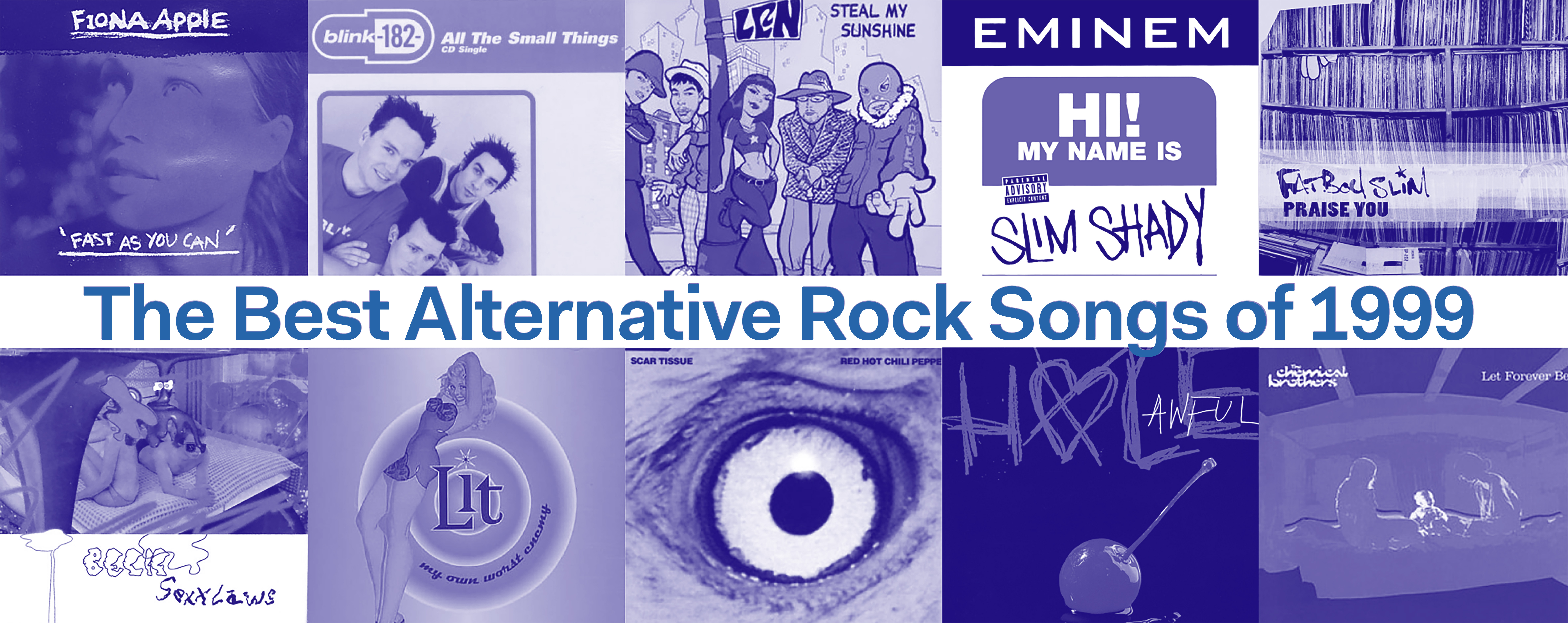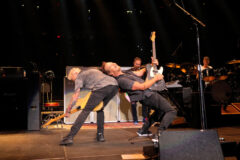50. Joydrop – “Beautiful”
This rollicking commentary on beauty and the jealousy from Canadian alt-rockers Joydrop is a clever record of the sort you might expect from a band that named their album Metasexual. “As a woman, I think the song gives a message that we can identify with pretty easily,” Joydrop singer Tara Slone told MTV News. “We’re so socialized to all of this beauty stuff – with all of the magazines and television. I think it’s empowering for women to hear another woman say that it’s OK to be who you are. It’s a subject I feel strongly about.” — ISRAEL DARAMOLA
49. R.E.M. – “Lotus”
After longtime drummer Bill Berry left R.E.M. in 1997, the band started working with keyboards, drum machines, and an occasional session drummer, continuing their departure from the career-defining jangle-rock of Document and Out of Time. Up‘s second single, “Lotus,” is about as safe and straightforward as it gets for R.E.M. during their Nineties run. Over a steady pulse of Rhodes chords, Michael Stipe sings about a psychedelic comedown, freely associating about “crowbar spines.” Even in the context of an otherwise eccentric album, the track pales in comparison to the narrative aspects of the bigger hit “Daysleeper.” If anything, “Lotus” is a snapshot of one of the biggest bands in the world at a time when they were still willing to experiment. — ROB ARCAND
48. Static-X – “Push It”
By 1999, nü-metal had pushed alternative into heavier, darker depths, offering commercial opportunities for hard rock bands who’d been kicking around with little recognition during alt’s sunnier summers. Distinctively coiffed singer/guitarist Wayne Static formed this L.A. industrial-pop group after his band Deep Blue Dream broke up—his bandmate, Billy Corgan, had decided to pursue more lucrative musical options. On Wisconsin Death Trip, Static was more of a gonzo goofball than most of the aggro emoters storming modern rock, and the band’s stripped down pummeling made “Push It” a natural fit for video game soundtracks. Its chorus offered as pure a distillation of rock’s covetous id as you could ask: “I see it, I need it.” Sadly, Static died in 2014, but the band’s soldiering on with a 20th anniversary tour for their breakthrough album. — KEITH HARRIS
47. Bush – “The Chemicals Between Us”
Gavin Rossdale had a talent for arriving late to the party: Flowing locks, hair metal balladry, whiskery Cobain timbre, Steve Albini—the Bush singer-songwriter acted as if he could drink everyone else’s beers, not caring that he didn’t bring any. Realizing that everyone from Madonna to Smashing Pumpkins had started programming their beats and calling the results “electronic,” Rossdale and crew released The Science of Things in 1999, a critically panned, commercially underperforming record that didn’t even sound as fresh as David Bowie’s two-year-old drum’n’bass record. However Science did boast a decent ringer in “The Chemicals Between Us,” a Garbage-style grungetronica anthem. A nifty chord change announces the part where he quotes T.S. Eliot. — ALFRED SOTO
46. Limp Bizkit – “Re-arranged”
“Re-Arranged,” Limp Bizkit’s only No. 1 on the Modern Rock chart, was the perfect slithering, brooding follow-up to the tantrum that was “Nookie.” The same ex-girlfriend that inspired that song was still Durst’s muse. “We broke up, like, two years ago,” Fred Durst told Spin in 1999. “But I’m hurt, and I kind of can’t get over it.” The video was a bit more playful, with the band on trial for inciting riots, a nod to their role in the Woodstock ’99 debacle. Matt Pinfield, in the greatest music video cameo of the MTV vet’s career, plays the judge who sentences the band to death by drowning in milk, for some reason. — AL SHIPLEY
45. Train – “Meet Virginia”
“Meet Virginia” does not have the effortless intergalactic liftoff of “Drops of Jupiter (Tell Me),” which would leave its indelible mark on our culture a few years later, nor does it quite betray how remarkably annoying this band would become a decade into its existence circa “Hey Soul Sister.” Instead, it’s mostly a signpost marking alt-rock’s journey from grunge to adult contemporary. Singer Pat Monahan, whose voice evokes the specific feeling of being on hold, sings about a bewitching rebel girl with messy hair, his voice straining to break free from the chorus’ sludgy guitars. It’s a nice enough tune, but even without the benefit of hindsight, you get the sense that the launch sequence is still only in its planning stages. — JORDAN SARGENT
44. Third Eye Blind – “Anything”
A string of singles kept the San Francisco quartet’s eponymous debut on the charts well into 1999. A better-than-average ear for hooks and singer Stephan Jenkins’ gentle sneer distinguished Third Eye Blind from the competition. “Anything,” the first single from followup Blue, was a tease: four seconds of acoustic love-buzzed twaddle (“Anything for you / Turn my castles blue”) before launching into a 1:56 of sun-blasted Cali punk, Go-Go’s style. — ALFRED SOTO
43. Khaleel – “No Mercy”
New York City native Bob Khaleel, a.k.a. Bronx Style Bob, was a breakdancer and fixture in the ’80s downtown NYC art and club scenes before he collaborated with the likes of Ice T, Afrika Bambaataa, and Grandmaster Melle Mel. After years of touring the world in various hip-hop groups, funk bands, and breakdancing crews, he tried his hand at writing radio-friendly pop songs, and scored a hit with “No Mercy,” a dreamy, steel drum-heavy, sadly prescient meditation about a world on the precipice of an environmental disaster. — MAGGIE SEROTA
42. Lit – “Zip-Lock”
Lit were SoCal anti-heroes whose sawtooth hair defied gravity, who enjoyed jumping three feet into the air to windmill their guitars when their choruses hit. Dressed like dirtbag show-offs haunting your local bowling alley, they were always the coolest guys at MTV Spring Break. “Zip-Lock” was the connective tissue between breakthrough pop single “My Own Worst Enemy” and 2000’s “Miserable,” which gained traction with its stuttering wordplay and a video featuring the band as Incredible Shrinking Men traipsing all over giantess Pam Anderson. It was the year of Blink-182, and in an expert cross-branding exercise, Lit featured them in the video for “Zip-Lock”—a song that Mark, Tom and Travis could easily have recorded themselves. — WINSTON COOK-WILSON
41. Chris Cornell – “Can’t Change Me”
The late Chris Cornell’s remarkable career included fronting three platinum bands, recording a handful of classic soundtrack cuts, and performing plenty of scene-stealing guest vocal turns. Yet his four solo albums remain the most unsung part of his career. Even Euphoria Morning, the debut he released in 1999 during the gap between Soundgarden’s breakup and Audioslave’s formation, got a relatively muted response from the public. That might be due to the Beatlesque vibe of the lead single “Can’t Change Me,” which Cornell told SPIN in 1999 was “a conscious decision to break with the Soundgarden sound.” Still, the chorus “She’s going to change the world/But she can’t change me” is a very Nineties battle cry of a romantic slacker who knows he’s going to let down a woman he doesn’t deserve. — AL SHIPLEY





